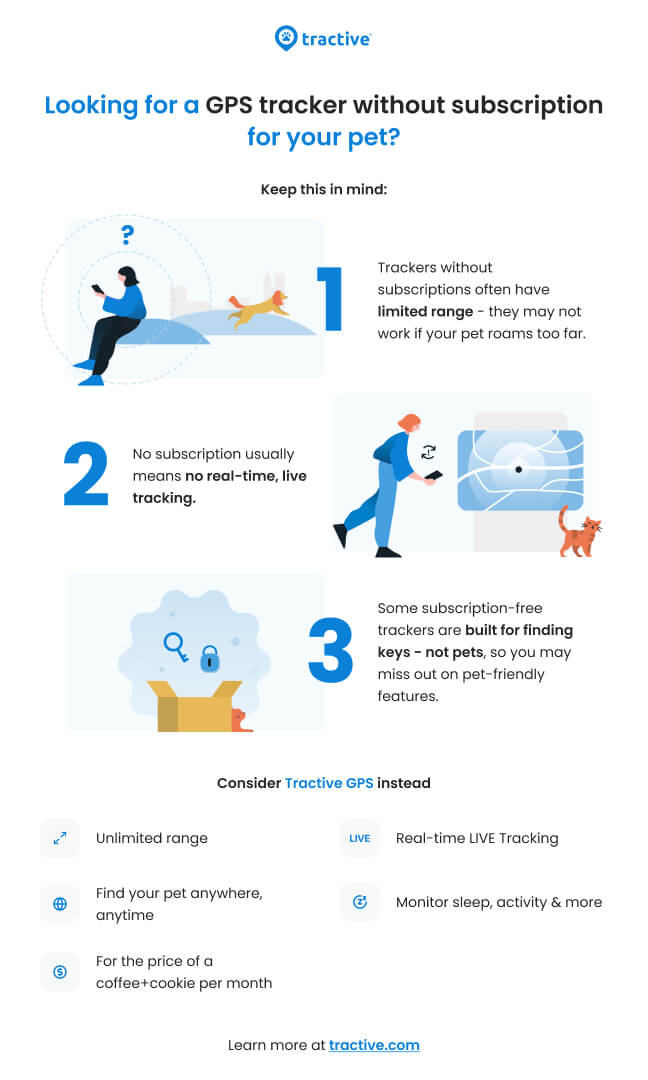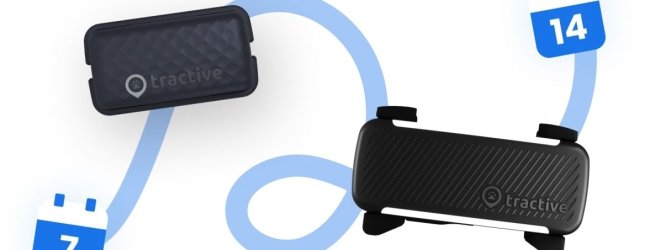GPS Tracker without SIM Card? Your Questions, Answered.
Get the answers to all of your questions about GPS trackers with and without a SIM card. Plus, find out why you're best-equipped to keep your dog or cat safe with a SIM card, subscription and cell service.
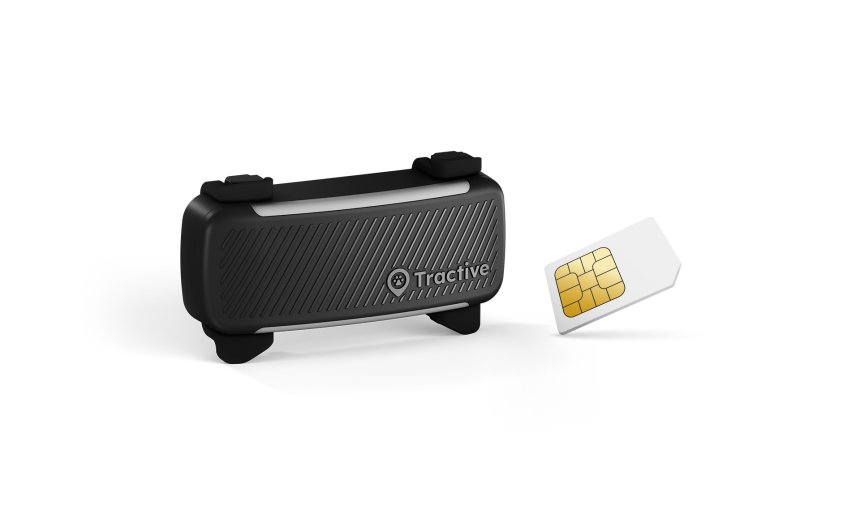
With so many types on the market, it’s easy to feel overwhelmed. You might ask yourself why some trackers rely on SIM cards. Should you consider one without a SIM or a monthly plan? And where do Bluetooth trackers fit into all this? You probably have these questions and more. Luckily, we have the answers.
Key Takeaways: Is there a GPS tracker without a SIM card?
- GPS trackers without SIM cards do exist. They only record location data locally – you have to connect them to a computer to view it later, and they don’t support real-time tracking.
- SIM cards enable real-time tracking by sending location data to your phone or computer via the cellular network.
- Most GPS trackers use SIM cards and require a monthly fee – but this allows for real-time, long-distance tracking.
- Why might a GPS tracker need a SIM card?
- What are the different types of GPS trackers?
- GPS Tracker Comparison
- Do all GPS trackers need a SIM card?
- How do I choose the right GPS tracker for me?
- What are the perks of having a GPS tracker with a SIM card?
- How does a GPS tracker with a SIM card work ?
- Do Bluetooth trackers need SIM cards?
- Can I use a GPS tracker without cell service?
- What about a GPS tracker without subscription?
- What’s the best GPS tracker for tracking pets?
- Wrapping up: Is there a GPS tracker without a SIM card?
Why might a GPS tracker need a SIM card?
If a GPS tracker is sending location data over a cellular network, it will need cell service and a SIM card. If you want to send GPS location from, say your tracker to your phone, you’ll need a SIM card to help the two “communicate.”
A GPS tracker is a device that uses Global Positioning System (GPS) technology to determine and record the location of something. It can track the movements of a person, pet, vehicle, or object over time. In most cases, the location data is sent to an internet-connected device (like a smartphone or computer) via a cellular network, radio signal, or satellite connection.
GPS trackers are often used by companies to track vehicles and cargo – and let you see where your delivery is. It’s also loved by outdoorsy athletes, farmers who want to keep an eye on their animals, and pet parents around the world.
What are the different types of GPS trackers?
There are many different kinds of GPS trackers. For example, small, wearable ones for pets, hikers or hunters. It also includes devices that can share live location in case of emergency.
Larger GPS trackers – like a car navigation system – often have a screen, and can help with following directions. Think of your Google Maps setup when you’re out driving. Asset trackers, on the other hand, mean business, and help companies follow trucks, boats, containers and more.
⚠️ Beware of “fake” GPS trackers – a.k.a. Bluetooth tracking devices – that are sold as GPS units even though they don’t have GPS technology.
GPS Tracker Comparison
To help you get your head around the different types of tracking devices out there, we’ll be comparing four categories: GPS trackers, satellites or iridium trackers which contain a SIM card, GPS data loggers, and navigation systems which do not require a SIM card.
| GPS Trackers | – Small, personal GPS tracker used to track pets, vehicles and people – Real-time, live tracking – SIM card required, connects to best network available – Unlimited range, worldwide coverage – Low cost (around $60) and a monthly fee priced less than your Netflix subscription – Popular brand: Tractive |
| Satellite Messaging Trackers | – Adventure and rescue tracker: best for extremely remote areas, as it can provide potentially life-saving communication where there’s no cell service – Not GPS: Uses satellite communication systems (such as Iridium or Globestar) – SIM card might be required, depending on the tracker – Unlimited range, worldwide coverage & real-time tracking – High cost of $100 to $600 and a monthly subscription fee of about $15 – Popular brands: Spot (Globalstar) or Garmin Inreach (Iridium) |
| GPS Loggers | – Only records routes, which can be viewed on your computer after a hike or walk is over. Used by outdoor sports enthusiasts. – No real-time tracking, only passive. No protection against theft. – Location data is stored locally, not transmitted. – No SIM card required. The route is not sent to a phone or network – Exact positioning, worldwide coverage – Costs around $50 – $150 – Popular brand: Renkforce |
| GPS Navigation Systems | – Used in cars and vehicles for navigation purposes. – Built-in screen which displays location and route – No SIM card required, data stays on the device – Costs between $100 – $350 – Popular brand: Garmin |
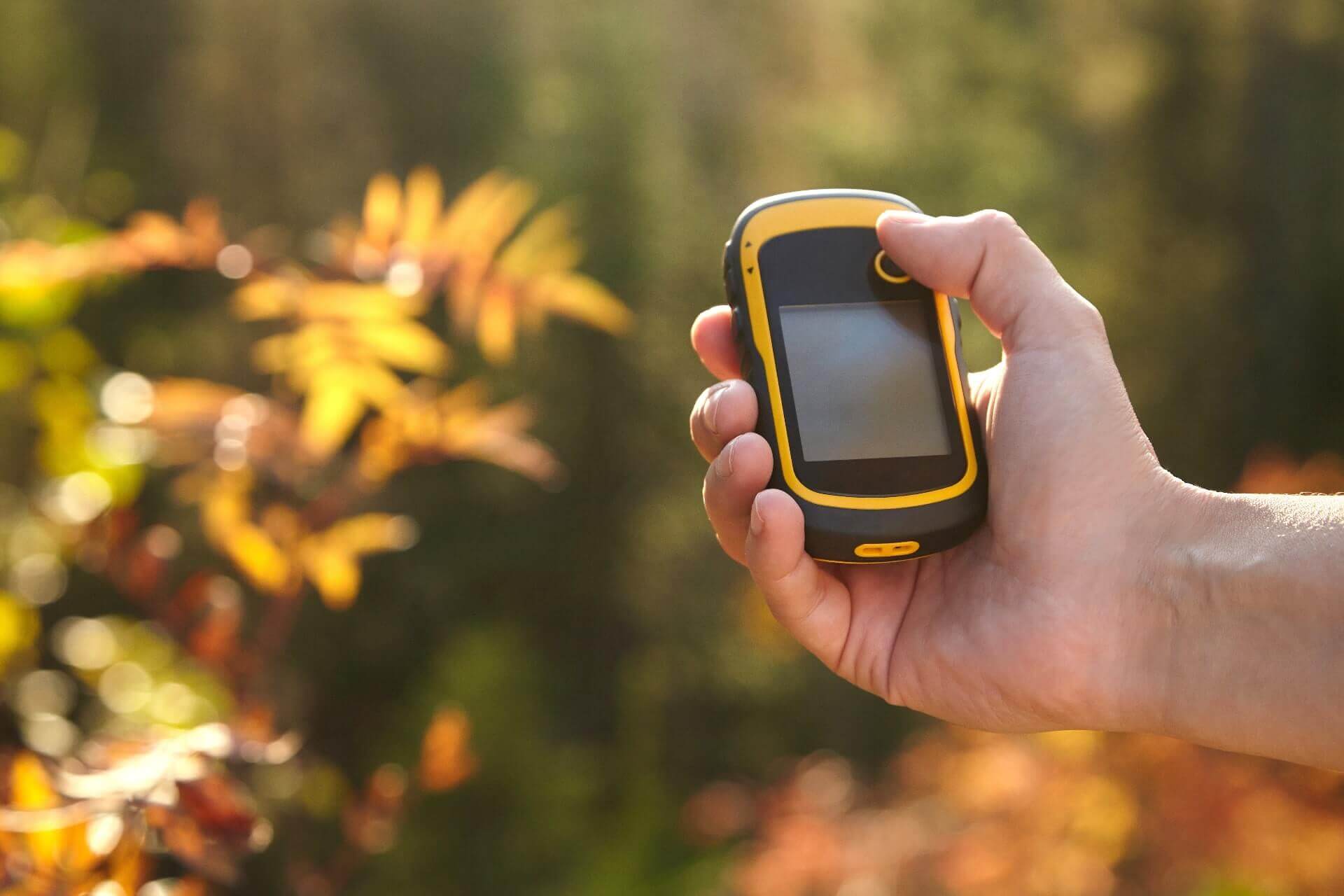
Do all GPS trackers need a SIM card?
Technically, no. Some devices – like in-car GPS navigation systems or GPS loggers – work without one. These store location data locally and don’t transmit it in real time. However, real-time trackers, such as those used for pets, vehicles, or people, typically include a SIM card to send live location updates over a cellular network. There are also satellite messaging devices, like those using Iridium or Globalstar networks. Some of these may use SIM cards as well, depending on the technology and provider. In GPS trackers that do use SIM cards, some are removable, while others are built-in and non-replaceable.
How do I choose the right GPS tracker for me?
When it comes to getting a GPS tracker, the first thing to do is think about what you need it for. A GPS tracker for a dog will have totally different requirements than a GPS tracker used to track a company truck. In fact, the price tag and monthly fee alone might be a turn-off.
Generally, a GPS tracker without a SIM card or subscription plan means you might be missing out on key features like tracking your pet in real-time, getting location updates and unlimited range.
Here are a couple of other factors to consider as well:
- Battery Life
How long should the battery last on one charge? 24 hours? 7 days? Or one year? A longer battery life often comes with the trade-off of fewer features, or a higher price. - Battery Type
Should the battery be replaceable, non-exchangeable, or rechargable? - Charging
What kind of charging mechanism should the tracker have? Do you want to be able to charge it like your phone, or keep it plugged into your car at all times? - Range and coverage
Over which distance should the tracker work? Is unlimited range important, or is it enough that it works in your backyard? Will you be using it in the city, or in the countryside? - Durability
Should the device be waterproof? Shock-proof? Chew-resistant? - Size and Weight
How big should the tracker be? Does it need to be small and lightweight? - Features
What extras would you like from your GPS tracker? For example, location history or health monitoring?
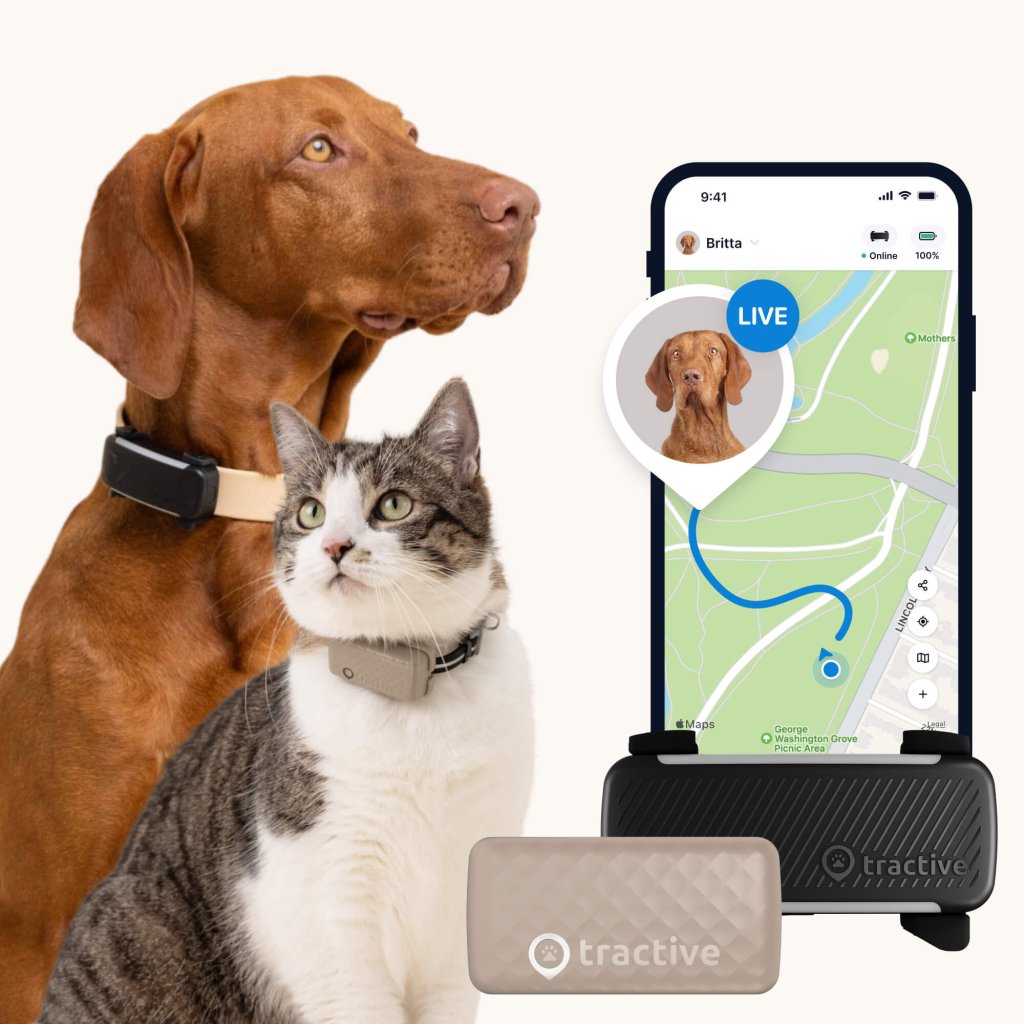
Keep your pets healthy & safe
Get real-time location information, wherever they go. See how much – or how little – activity they’re getting. And get Health Alerts if something might be wrong.
What are the perks of having a GPS tracker with a SIM card?
Wireless communication between devices
The advantage of a built-in SIM card in your tracker is that it’s connected to the local mobile network. That means it can communicate with other devices. Say you put a GPS tracker on your pet’s collar. The tracker’s SIM card lets it forward location data to your phone. Without a SIM card in the GPS tracker, this would normally not be possible.
Real-time tracking
A SIM card also lets you track every moment. For example, the Tractive GPS lets you go into LIVE Mode to get location updates every couple of seconds, and know your cat or dog is safe and sound. All that is made possible by the tracker’s integrated SIM card.
How does a GPS tracker with a SIM card work?
A GPS tracker with a SIM card contains a GPS module, a cellular module (such as GSM or LTE), a SIM card, and a small CPU. The GPS module receives signals from at least four satellites to determine the device’s exact location. That location data is processed by the CPU and sent through the mobile network via the SIM card. Instead of going directly to your phone, the data is first sent to a cloud server – where it’s then displayed in real time on a GPS tracking app, like the Tractive GPS app.
Do Bluetooth trackers need SIM cards?
Most Bluetooth trackers don’t use GPS technology so there’s no need for them to include SIM cards. Because of this, they can’t track in real-time and usually work only up to a limited range. (Usually up to 200 feet or 60 meters.) Which makes them a decent, lightweight option to attach to a pair of keys or backpack or a bicycle, i.e. non-moving physical objects that don’t tend to move around by themselves.
At the same time, some combination GPS/Bluetooth trackers do exist, like Tractive. Besides real-time tracking, Tractive devices also include short-range Bluetooth tracking to help you locate your dog or cat in places where you might not catch network signal.
Can I use a GPS tracker without cell service?
Most GPS trackers are capable of recording GPS data without cell service. That’s the essential function of a GPS receiver. The big question is, how would you like to view the location data? A GPS logger can help you record GPS coordinates (without cell service) which you can look at later on a computer.
Similarly, a navigation system displays location on the tracking device itself, meaning it doesn’t need cell service. For real-time tracking however, cell service is usually needed so the tracker can actively send location data to your phone (or tablet, or computer) in real-time.
Besides, Tractive devices also come with features like Location History, which continues to log your pet’s location even if you run out of service.
“If you want to pinpoint your pet’s location or store their Location History, you don’t actually need a cellular connection.
Once you’ve equipped your Tractive GPS, there’s no need to worry if your device loses coverage for a little while. Your tracker stores your pet’s positions securely. So you’ll be able to see where they’ve been even if you’re offline.”– Ivelin Nenkov, Embedded Systems Engineer at Tractive since 2016
What about a GPS tracker without subscription?
You might be wondering if there is a GPS tracker with a subscription plan. Is it possible? Sure. Is it useful? Probably not. After all, most people looking for a GPS tracker for personal use in 2025 would like to be able track from the comfort of their phone. And one of the best ways to make that happen is a SIM card and cell service.
Plus, a subscription can come with a lot of peace of mind. For example, the SIM cards used in Tractive GPS trackers work with as many local cell networks as possible, all across the world. That way, you don’t have to worry about losing coverage because you’re tied to a single provider.
All of that, for what comes to the price of a coffee and a croissant per month. Not bad, right?
To find out more about features and services that come with a subscription and GPS tracker SIM card, check out our Tractive plans.
What’s the best GPS tracker for tracking pets?
To track your dog or cat in real-time (as you might often need to), we recommend Tractive. This smart GPS & health tracker for pets has a built-in SIM card that automatically connects to the best network, so you can track your furry friend anywhere in the world. No need to buy your own SIM card!
Read more: Tractive reviews on Trustpilot
Wrapping up: Is there a GPS tracker without a SIM card?
SIM-free GPS trackers do exist. These trackers, however, are mainly used when real-time tracking between devices is not necessary.
- GPS loggers
These record route data, which can then be uploaded and viewed on a computer at a later point in time.2 As the name suggests, GPS loggers are great for logging GPS data, but not providing a real-time tracking service. - GPS navigation systems
Where GPS location info is displayed on the same device on it was recorded. In other words, no need for a SIM card. - Satellite messaging trackers
Like for example, Spot, which uses GPS to determine location, but then sends that data over the Globalstar satellite network rather than cellular networks. For this reason, they do not require a SIM card, but still require a high monthly service fee and initial investment. Satellite trackers are most helpful in remote areas with no cell coverage. For example, when you’re climbing mountains in the Alps and want to let your family know you’re OK. - Bluetooth trackers
Most Bluetooth trackers do not use GPS technology, so their range is very limited. However, some combination GPS and Bluetooth trackers (like Tractive) do exist. See our GPS vs Bluetooth tracker comparison for more information.
The bottom line: with the help of a SIM card, GPS trackers let you track your dog or cat in real-time. Without a SIM card, GPS trackers would most likely not be able to send GPS location data about your pet’s whereabouts to your phone. In other words, a SIM card can be a very valuable component of any GPS tracking device.
